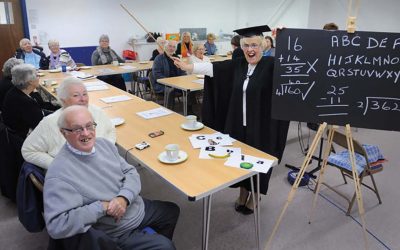It’s a blustery Sunday morning in early March, and Philip Stallard is braced against the elements as he surveys a lonely, rocky beach in West Wales.
This remote location has become one of the battlegrounds for Philip’s campaign against plastic pollution.
This morning, a group of volunteers are preparing to wage war with their trusted litter-pickers and plastic sacks.
The town was quiet, but the ocean roared in agony as it washed up assorted debris; used fishing equipment, plastic bottles, empty sun cream containers and flip-flops, as well as many other items.
Beaches across these isles are becoming a living horror story that many are failing to address.
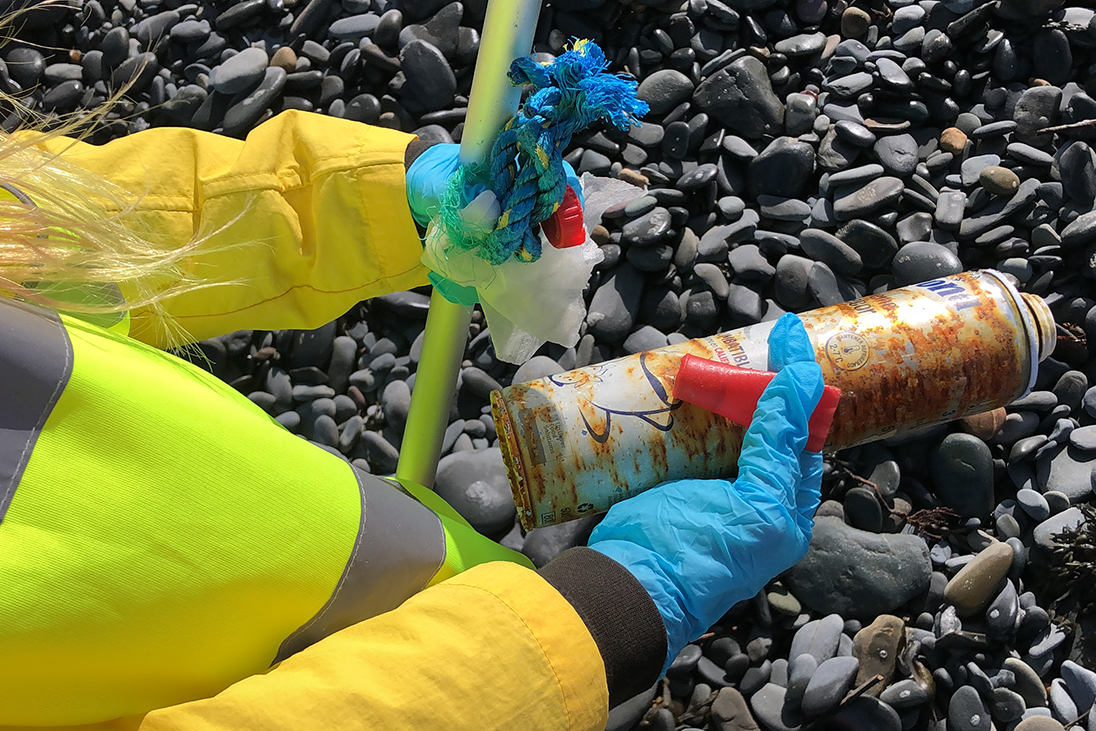

Just one small handful of litter from the Aberystwyth beach shows the variety of different items and large scale of the problem.
Philip, who works as the Countryside Access Volunteer Coordinator for Powys County Council, says he is seriously concerned about the pollution plaguing our waterways.
He aims to change this hand-in-hand with Rotary. Philip said: “We find hypodermic needles, an awful lot of dog mess, in bags and out, none of that is pleasant, and broken glass. However, the most dangerous thing is the plastic.”
To combat this, Philip and Llanidloes Rotary established the environmental campaign ‘Sending a Message in a Bottle’.
The project includes beach cleans, litter picks and raising the problem of plastic pollution.
Running for just over a year now, the initiative is starting to accelerate.
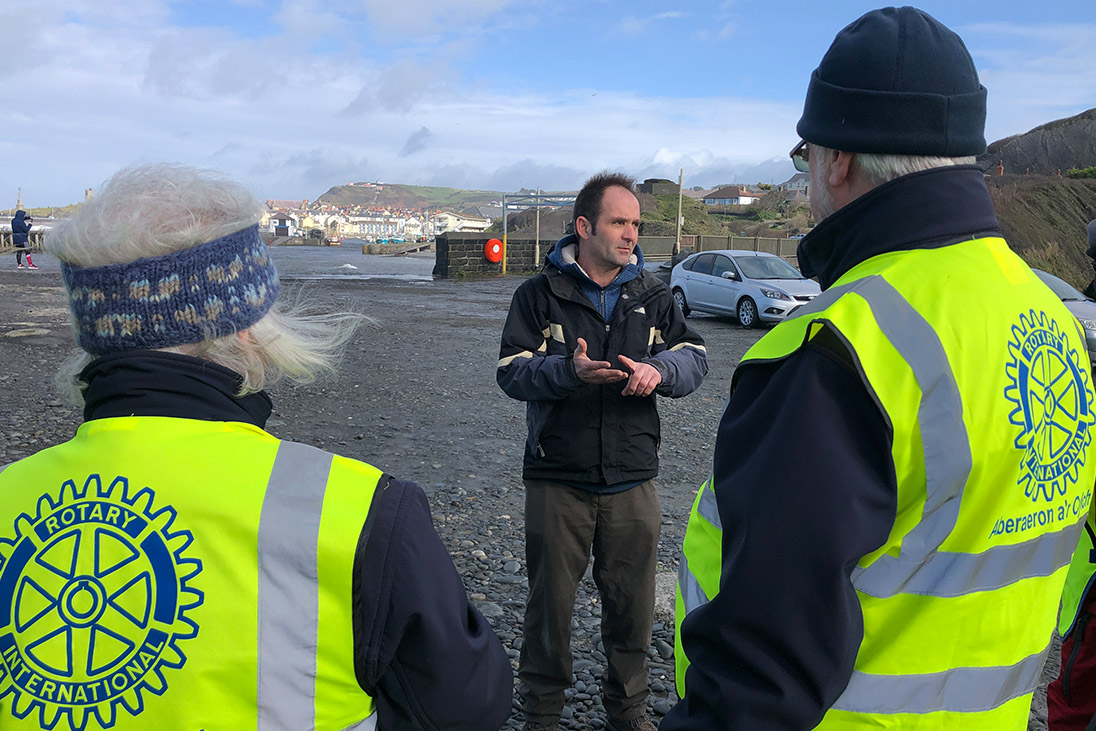

Philip Stallard briefs the team of Rotary volunteers before the beach clean gets underway.
Philip is taking this project from ‘source-to-sea’ and hopes to get more clubs involved, especially in counties along the route of the River Severn; Powys, Shropshire, Worcestershire and Gloucestershire.
Philip realised clearing communities along the source of the ocean plastic will decrease plastic pollution in the sea.
He said: “We can pick up litter on beaches forever, but if we go back to the source and stop it, then I believe everything will change.”
Clubs such as Newtown and Welshpool Rotary also clambered on board for a campaign inspired by David Attenborough’s television documentary, ‘Blue Planet II’.
Shocked by the reality Philip, along with Newtown Rotary and many other volunteers, were stung into action and collected a stunning 580 kg of litter from streets, parks, estates and the river in the town.
Beaches across these isles are becoming a living horror story that many are failing to address.”
All of this could potentially end up in the sea but has now been put safe from causing harm. A complete motorbike was also pulled from the Severn.
The source of the River Severn is in a deep, blanket-peat bog on the slopes of Plynlimon, 800 metres outside Hafren Forest’s boundary, and close to the Powys town of Llanidloes.
From there, Britain’s longest river runs for 220 miles from the Welsh mountains, through the beautiful Shropshire and Worcestershire countryside, and down to the flatlands of the Severn estuary.
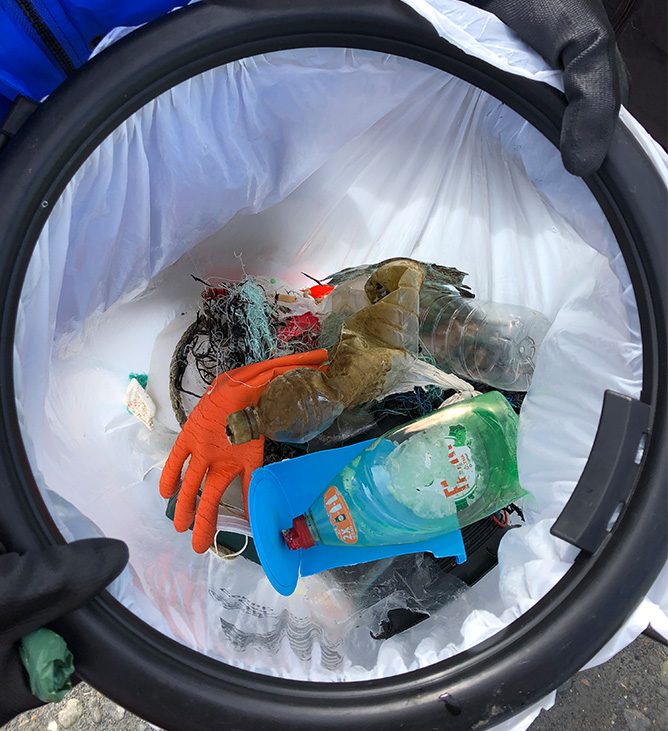

40% of plastic produced is for packaging, such as food and other household items, much of which has just a single use.
Recently, Llanidloes Co-op boosted the project by donating three thousand bags which are to be given to youngsters in the towns along the Severn during the ‘Sending a Message in a Bottle’ launch phase.
With a few fabric pens, the creative minds of the young people decorated the bags depicting the animals they wanted to protect.
By striking at the hearts and minds of environmentally-aware youngsters, Philip knew that this is the best way of the campaign getting traction.
And it is working. Philip said: “The success so far is incredible. I’ve been told off by parents who say, ‘We can’t even get on the beach now without the kids doing a litter pick first, what’s going on? You’ve changed everything about how they see litter’.
“Now, no kids in the schools I have spoken to will go on the beach without bringing litter off the beach.”
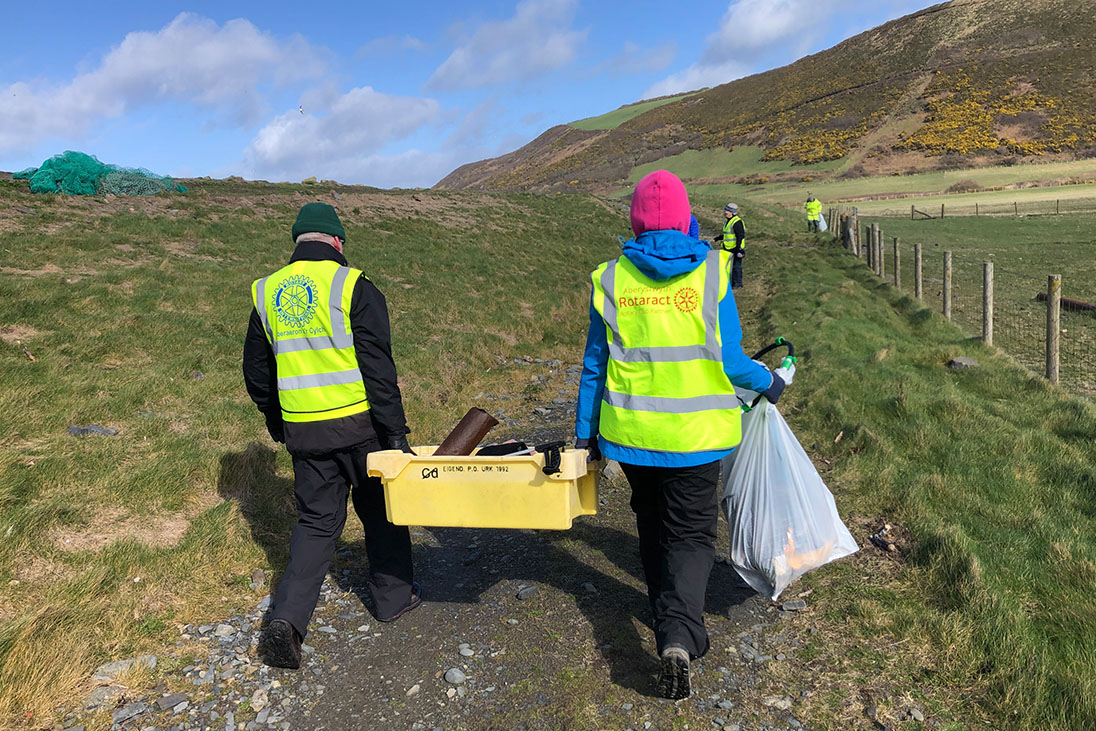

From micro-plastic pieces to large debris, the team found all manner of rubbish across the beach and surrounding countryside.
The top enemy is plastics. However, to most, plastic is a useful material.
Researchers have discovered that over 40% of plastic produced is packaging, so it is used once and then discarded.
And eight million tonnes of plastic enters the oceans every year – equivalent to five shopping bags sitting on every foot of coastline around the world.
Plastic is at the fingertips of many all day long; water bottles, your computer mouse and keyboard. The amount is unimaginable.
Recent research has shown that the toxins inside plastic are affecting both animal and human health conditions.
Philip explained: “There is a very good chance that we are breathing it [toxins] in, it is falling on us within the rain, affecting our crops, let alone fish stocks and everything else.”
This is one of many reasons he is pushing for a change in the use of plastic within planet Earth.
There is a very good chance that we are breathing toxins in.”
During the clean-up in Aberystwyth, different Rotary clubs arrived promptly, along with Rotaractors and other community warriors.
Volunteer Cat explained why she enjoys attending events like this. She said: “As I was picking up rubbish that humans have put into the sea, I also collect natural things like pieces of wood, and shells and any interesting drift that’s come out of the sea.
“You can make something beautiful from something natural.”
Each beach clean is always a success, bags are filled to the brim of random items – such as gloves and old paint cans.
Philip hopes to roll the campaign across more clubs, after already reaching out to Rotary members in Powys.
To join Philip Stallard and his team of volunteers, visit the website.









